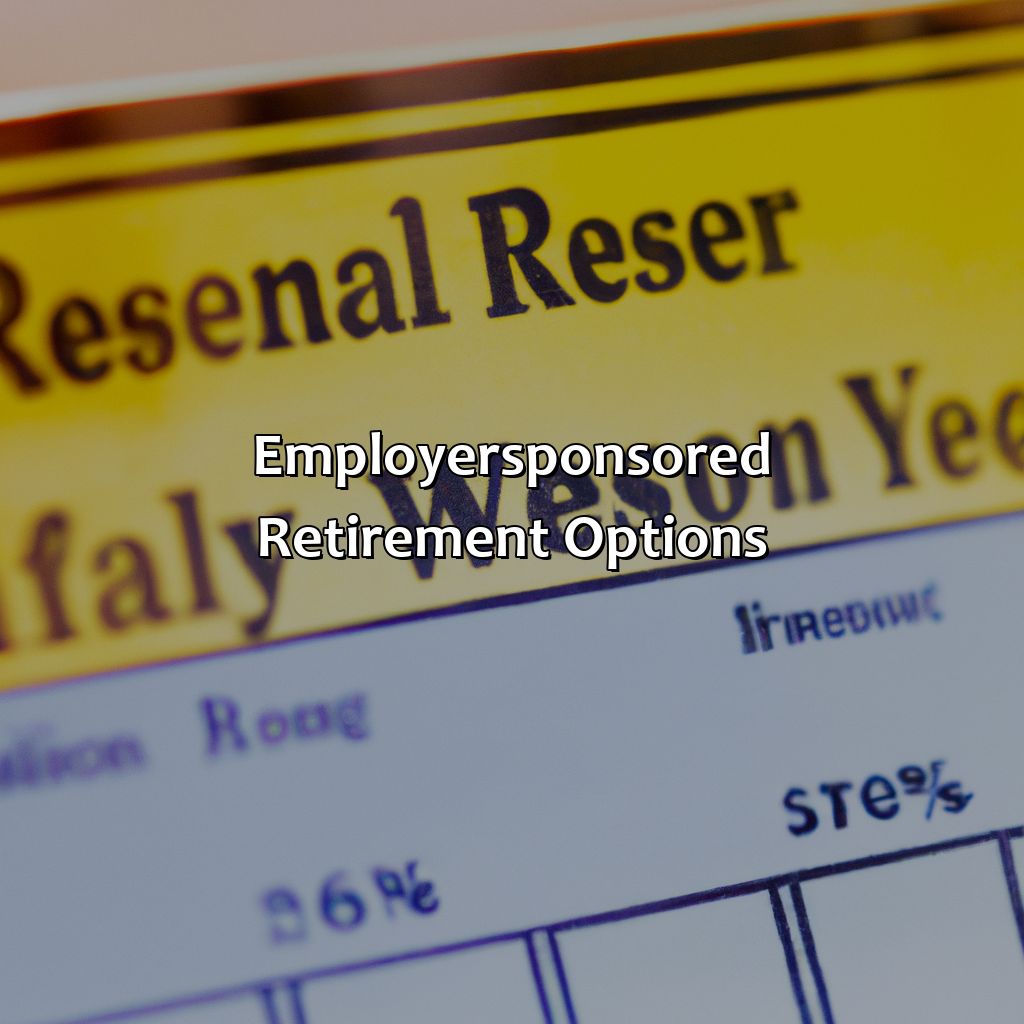What Other Retirement Options Besides 401K?
Key Takeaway:
- Individual retirement accounts (IRAs) can provide a tax-advantaged way to save for retirement, with contribution limits that vary based on the type of account. IRAs also offer flexibility in terms of investment choices and distribution options.
- Annuities can be used to create a stream of income in retirement, either through a single lump sum payment or a series of payments over time. There are different types of annuities, such as fixed or variable, and considerations such as fees and surrender charges should be taken into account.
- Real estate investments provide another option for retirement savings, either through direct ownership or through real estate investment trusts (REITs). These investments can offer a potential for rental income and appreciation, but also come with risks such as market volatility and maintenance costs.
Are you worried that your 401k is not enough to secure your retirement? Look no further – we will tell you about all the other options you have to plan for the future! You will be able to find the perfect plan to fit your needs.
401k Retirement Option
As retirement approaches, individuals start considering the best retirement options available. 401k retirement option is a well-known option that allows employees to contribute a percentage of their income into a retirement account. This account is tax-deferred, and in some cases, employers contribute to the account as well. But aside from the 401k option, there are alternative ways to save for the golden years.
One alternative retirement option is a traditional IRA, which allows individuals to contribute pre-tax earnings to this account. Another option is the Roth IRA, which is similar to the traditional IRA but taxes are paid upfront, making withdrawals tax-free upon retirement. Another option is the self-employed 401k option, also known as a Solo 401k. This option is available for individuals who are self-employed or own their own businesses. The contributions limits are higher than a traditional 401k, and individuals can contribute from both employer and employee standpoints.
It is important to note that each retirement option has its pros and cons. Individuals should consider their unique financial situations and speak to a financial advisor to determine the best option. For instance, Traditional IRAs are suitable for high-income earners who plan to earn less during retirement.
A true history is that 401k retirement plans originated in 1978 when Congress passed a law that allowed employees to contribute a portion of their income towards savings. The name “401k” comes from the section of IRS code that details this plan. Over time, the 401k plan has become a popular retirement option for most American workers.

Image credits: retiregenz.com by Adam Jones
Alternative Retirement Investments
Retirement Investing Alternatives: Exploring Other Options Beyond 401k
Many people approaching retirement age are uncertain about their investment options beyond 401k. However, there are several alternative retirement investments worth considering. Real estate investing, for instance, can yield significant income, while annuities provide a guaranteed income source. Additionally, high-income individuals can set up a self-directed IRA with non-traditional assets, such as precious metals or private equity.
It’s important to note that alternative retirement investments have their own risks and rewards, so it’s crucial to conduct thorough research before investing. According to Forbes, about half of all self-directed IRA account owners have a net worth of at least $1 million.
Did you know that a self-directed IRA account can purchase artwork and other collectibles? According to the IRS, the account must own and store the collectibles, so it’s important to consult with a financial advisor before making any purchases.

Image credits: retiregenz.com by Yuval Arnold
Employer-Sponsored Retirement Options
In this article, we will discuss the different retirement options companies offer to their employees. These options can greatly benefit employees as they are designed to help them save for their future. Here are some of the Employer-Sponsored Retirement Options:
- 401k Plans – A popular retirement plan that provides employees with a tax-advantaged way to save for retirement. The employer may also match the contributions made by the employee.
- Pensions – An employer-sponsored retirement plan that guarantees a fixed income for life. The amount is usually based on the employee’s salary and years of service.
- Profit Sharing Plans – A plan where the employer contributes a percentage of profits to the employees’ retirement accounts. The contribution is discretionary and can vary each year.
- Employee Stock Ownership Plans (ESOP) – A plan where the employer provides the employees with stocks in the company. The stocks can be purchased at a discounted price and can be held until retirement.
It is worth noting that some employers offer a combination of these plans to their employees. Additionally, there may be eligibility requirements, vesting schedules, and other restrictions for each plan.
It is important for employees to understand their options and choose the plan that works best for their retirement goals. It is also recommended to consult with a financial advisor to ensure all retirement planning goals are met.
One individual’s story highlights the importance of understanding employer-sponsored retirement options. John had been contributing to his employer’s 401k plan for 10 years when he learned that his employer also offered a pension plan. He had not been aware of this option and immediately enrolled in the pension plan, increasing his retirement savings significantly.

Image credits: retiregenz.com by Joel Arnold
Five Facts About Retirement Options Besides 401k:
- ✅ IRA (Individual Retirement Account) is one of the most popular alternatives to 401k, providing tax advantages and investment options. (Source: Investopedia)
- ✅ Annuities, which provide guaranteed income for life, are another retirement option besides 401k, but can come with high fees and restrictions. (Source: NerdWallet)
- ✅ Health Savings Accounts (HSAs) can be used as retirement accounts, allowing tax-free contributions and withdrawals for eligible medical expenses. (Source: Forbes)
- ✅ Real estate investing can also be a viable retirement option, providing potential rental income and long-term appreciation. (Source: USA Today)
- ✅ Social Security benefits are often overlooked as a retirement option besides 401k, but can provide a significant source of income during retirement. (Source: The Motley Fool)
FAQs about What Other Retirement Options Besides 401K?
What other retirement options besides 401k?
There are several other retirement options you can consider besides 401k. These include:
- Individual Retirement Accounts (IRAs)
- Simplified Employee Pension Plans (SEPs)
- 457 Plans
- 403(b) Plans
- Cash Balance Pension Plans
What is an Individual Retirement Account (IRA)?
An Individual Retirement Account (IRA) is a type of retirement account that allows individuals to save for retirement while enjoying tax benefits. You can contribute up to $6,000 per year if you are under 50 years old and up to $7,000 if you are over 50 years old. There are two main types of IRAs: traditional and Roth IRAs.
What is a Simplified Employee Pension Plan (SEP)?
A Simplified Employee Pension Plan (SEP) is a type of retirement plan for self-employed individuals and small business owners. It allows them to make tax-deductible contributions to their own retirement accounts and to the retirement accounts of their employees. The employer can contribute up to 25% of an employee’s salary, up to a maximum of $58,000 per year.
What is a 457 Plan?
A 457 Plan is a retirement savings plan that is available to state and local government employees, including police officers, firefighters, and teachers. It allows them to contribute up to $19,500 per year, and the contributions and any earnings grow tax-deferred. The plan also has a catch-up provision that allows participants who are within 3 years of retirement age to contribute an additional amount.
What is a 403(b) Plan?
A 403(b) Plan is a type of retirement plan for employees of public schools, nonprofit organizations, and certain tax-exempt organizations. It allows them to make contributions to their retirement accounts on a tax-deferred basis. The annual contribution limit for 2021 is $19,500, and participants who are over 50 years old can make an additional catch-up contribution of up to $6,500.
What is a Cash Balance Pension Plan?
A Cash Balance Pension Plan is a type of defined benefit pension plan that allows the participant to receive a lump-sum payment when they retire, instead of a monthly annuity. The plan credits the participant’s account with a set amount of money each year, which earns interest. The employer is responsible for funding the plan, and the participant is not required to make contributions.



